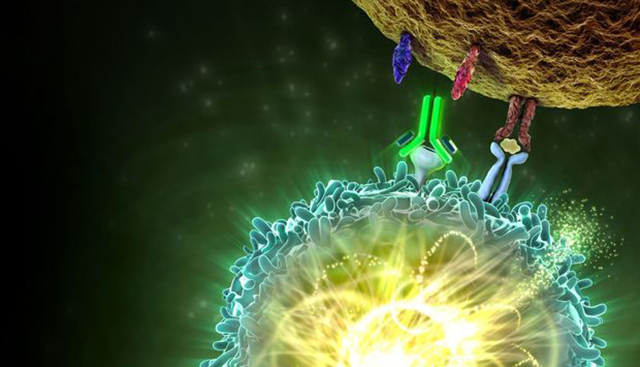
Preclinical Research Uses Oncolytic Adenovirus That Selectively Kills Cancer Cells While Revving Up The Immune System
Moffitt Cancer Center, in collaboration with the biotechnology company Memgen, is working to develop a new cancer vaccine that could be used to treat several cancers by itself or in combination with other immunotherapies.
One type of cancer vaccine is referred to as oncolytic virus therapy where a physician injects a genetically modified virus directly into a patient’s tumor. The virus then infects cancer cells, while leaving healthy cells unharmed. The viral infection causes the cancer cells to break down and die, which releases proteins that trigger the immune system to target any remaining cancer cells. Currently, there is only one oncolytic virus therapy approved by the U.S. Food and Drug Administration, Talimogene laherparepvec, also known as T-VEC, which is a genetically modified version of the herpes simplex virus that is used to treat advanced melanoma.
Preclinical research, that was presented at the American Association for Cancer Research Annual Meeting, shows that the MEM-288 vaccine can work as a single therapy or be combined with immune checkpoint inhibitors.
“Immune checkpoint inhibitors are a great treatment option, but they do not work for everyone. This oncolytic virus therapy may be able to help, stimulating tumors that may not typically respond to this treatment,” Dr. Amer Beg, Senior Member, Department of Immunology said. “Our lab studies show that MEM-288 can work in a broad range of human solid tumor cell lines, including lung cancer.”
MEM-288 is a conditionally replication-enhanced and dual-transgene armed oncolytic adenovirus designed for the treatment of both solid and liquid tumors that selectively kills cancer cells while revving up the immune system and stops it from turning off before cancer cells are eliminated. MEM-288 is rationally designed to overcome limitations of other oncolytic virus by conferring enhanced tumor selectivity, oncolytic activity, and ability to directly enhance dendritic cell and T cell functionality.
MEM-288 exhibited 100-fold greater replication and oncolytic activity in a broad range of human solid tumors and blood tumor types, including a variety of human lung tumor cell lines. MEM-288 also exhibited 1,000-fold greater viral replication in tumor cells compared to normal cell types. These positive in vitro results were expanded upon in multiple tumor models and intratumoral administration of MEM-288 demonstrated potent anti-metastatic activity.
Based on the study results, a phase 1 study using MEM-288 to treat patients with advanced lung cancer is expected to launch later this year.
To refer a patient to Moffitt, complete our online form or contact a physician liaison for assistance or support. As part of our efforts to shorten referral times as much as possible, online referrals are typically responded to within 24 - 48 hours.
